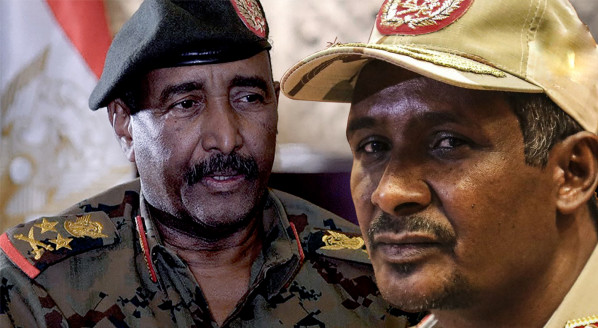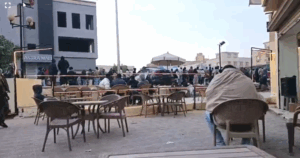RSF accepts Quartet ceasefire terms as Sudan’s army digs in

Lt Gen Abdelfattah El Burhan of the SAF (L),and Lt Gen Mohamed ‘Hemedti’ Dagalo of the RSF (R) (File photo)
The paramilitary Rapid Support Forces (RSF) announced their acceptance of the three-month humanitarian truce proposed by the Quartet, made up of the United States, United Arab Emirates, Saudi Arabia, and Egypt, raising hopes as well as reservations for relief amid Sudan’s devastating war.
In a statement yesterday, the RSF said it agreed to the proposal “in order to ensure that the catastrophic humanitarian consequences of the war are addressed, and to enhance the protection of civilians,” and vowed to “urgently bring humanitarian aid to all Sudanese people.”
The group added that it aspires “to immediately begin discussing the arrangements for the cessation of hostilities and the basic principles governing the political process in the Sudan.”
In its September 12th declaration, the Quartet outlined a ceasefire roadmap beginning with a humanitarian pause, followed by a full ceasefire and a transition to a civilian-led government.
Whilst the RSF accepted the proposed truce, Sudan’s army leadership has signalled outright rejection. After a meeting chaired by Head of the Sovereignty Council and Commander-in-Chief of the Sudanese Armed Forces (SAF), Lt Gen Abdelfattah El Burhan, the Security and Defence Council merely “welcomed international initiatives,” offering no endorsement of the proposal.
El Burhan later declared on a televised address on Thursday, the RSF would be defeated, calling the conflict “the battle of the Sudanese people.” He vowed revenge for victims in El Fasher and across the country and condemned foreign actors allegedly backing the RSF.
Lt Gen Yasir El Atta, deputy commander-in-chief of the SAF also dismissed the truce, closing the door on the Quartet plan.
US presidential adviser on Arab and African affairs, Massad Boulos, said both the SAF and RSF had “in principle” agreed to the truce, and Washington was “in dialogue with the parties on the details.”
The US State Department insisted it will continue direct talks with both sides to push a humanitarian pause, saying: “We continue our commitment to work with our partners, including the Quartet, to resolve the crisis in Sudan.”
‘International condemnation’
The RSF’s announcement comes as the group faces global condemnation for atrocities committed in North Darfur’s capital, El Fasher, where civilians remain trapped under the paramilitary force. Following the RSF’s capture of a Sudanese Armed Forces base last week, reports indicate that civilians have been subjected to mass killings, sexual violence, ethnically-targeted attacks, and starvation.
In response to the mounting calls, the RSF said it had formed a committee to investigate what it called “individual abuses.”
Since reports of RSF abuses in El Fasher came to light, the international community has stepped up pressure on the warring parties. Australia condemned “mass killings, sexual violence and deliberate attacks on civilians,” and pledged AU$10 million in humanitarian aid.
The United Kingdom called for an emergency session of the UN Security Council, while in Washington Senator Gregory Meeks urged Congress to cut off external support enabling RSF violence. Qatar renewed its appeal for an “immediate ceasefire” and a negotiated political solution, and Eritrean President Isaias Afwerki warned that Sudan was being “targeted by regional and global powers.”UAE and Egypt Defend Quartet Path
The UAE hailed the Quartet’s roadmap as “a historic step” and condemned “horrific crimes committed against civilians,” calling attacks on residential areas a “crime against humanity.” It urged unhindered humanitarian access, reiterating “there is no military solution to the Sudanese crisis.”
Egyptian Foreign Minister Badr Abdelatty backed the plan as the “only solution,” saying: “There is no external solution, and the parties that imagine that they will decide the matter militarily and impose their will are wrong, this is something that will not happen.”
US Senator Chris Van Hollen, who has accused the UAE of arming the RSF, briefly halted his move to introduce the Sudan Defence Act after the RSF accepted the truce.
“While their approval of the ceasefire is welcome news, it remains to be seen whether the RSF is really ready to stop their attacks on the people of Sudan,” he said, stressing that the SAF has yet to agree.
“For more than two years, death and destruction have torn Sudan apart, and this tragedy has been largely fuelled by the Rapid Support Forces armed by the United Arab Emirates,” he added.
Khaled Omar Youssef of the Sudanese Congress Party called the RSF statement a “laudable position” and urged the SAF to follow suit.
“The ball is now in the field of the armed forces [SAF],” he said in a statement yesterday. He warned Sudan risks losing a “real opportunity to stop the bloodshed and the mill of ruin.”
A delegation from the Sumoud (meaning resilience in Arabic) coalition, lobbied African and Western diplomats in Addis Ababa to back the Quartet roadmap.











 and then
and then